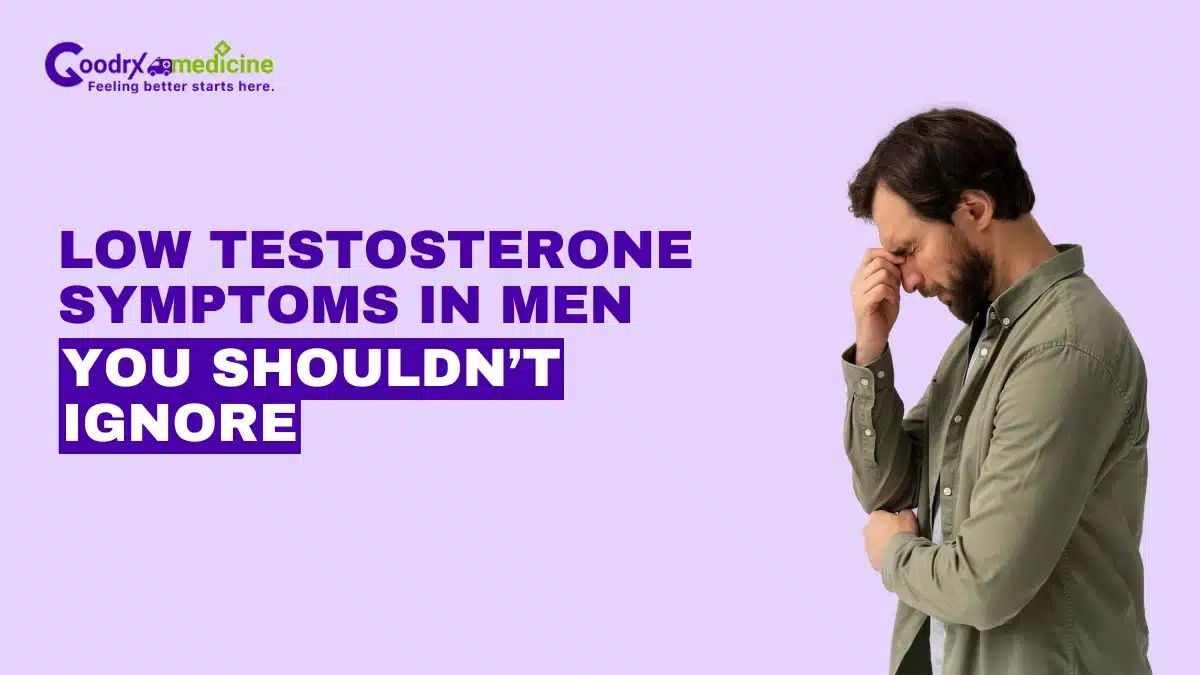Testosterone is a vital hormone that affects a man’s physical, sexual, and mental health. As men or Assigned Males at Birth (AMABs) age or due to some medical conditions, Testosterone levels might fall below normal, resulting in changes that are easily dismissed as just getting older.
Low testosterone (Low T), also known as Male Hypogonadism, can cause several symptoms, including decreased sex desire, chronic fatigue, muscle loss, mood swings, and even changes in hair growth or bone density.
These signs range from moderate to severe, and they often overlap with other health issues, which is why Low Testosterone is often misdiagnosed. Understanding these Low Testosterone symptoms in men is essential for early identification and effective care, helping men restore strength and enhance their overall quality of life.
This article will cover common signs and symptoms of Low Testosterone in men and what you can do to overcome them.
Common Low Testosterone symptoms in men
Normal Testosterone levels lie between 300 and 1,000 ng/dL (nanograms per deciliter). Levels below 300 ng/dl are considered low. Low Testosterone levels may show up in several ways. Some men may have multiple symptoms, while others have few or none.
These symptoms often develop gradually and may coexist with natural aging or other health issues. It’s important to note that Testosterone decline is a normal part of aging, typically beginning around the age of 30 and decreasing by about 1% each year.
However, a considerable reduction might result in apparent and severe symptoms, requiring immediate medical attention.
Let’s look at some of the most frequently reported Low Testosterone levels symptoms in men.
- Reduced sex drive (Libido): Low libido is one of the most common and initial symptoms of Low Testosterone in males. Men with Low T levels may experience a significant decrease in their sexual desire.
- Reduced semen volume: Testosterone drives the formation of semen, and lower levels can lead to a reduction in the volume of ejaculate, thus affecting fertility.
- Erectile Dysfunction (ED): Trouble achieving or maintaining erections is another commonly reported symptom of Low Testosterone in men. While Low T is not always the direct cause of Erectile Dysfunction, it can contribute to erectile difficulties in men, particularly in mild cases.
- Reduced muscular mass and strength: Testosterone is anabolic (promotes the synthesis of other molecules in the body), stimulating muscular development. Even with regular exercise, there may be a visible decrease in muscle mass and strength, indicating Low T levels.
- Increased body fat: Low Testosterone can cause an increase in body fat, especially around the belly. It can also cause Gynecomastia (enlarged breast tissue) because of an imbalance of Testosterone and Estrogen.
- Loss of body and facial hair: Testosterone influences hair formation. A decrease in facial, body, or pubic hair may indicate Low T.
- Hot flashes: While mostly associated with Menopause in women, extremely Low Testosterone levels (frequently observed in men following certain Prostate Cancer therapies) can also induce hot flashes in men. These are marked by sudden feelings of warmth, sweating, and skin reddening.
- Testicular shrinkage: In some circumstances, the testicle size may decrease due to Low T.
- Reduced bone density (Osteoporosis): Testosterone helps to preserve bone volume. Lower amounts can cause weaker, more brittle bones, which increases the risk of fractures.
- Fatigue and lowered energy levels: Other common symptoms of Low Testosterone in adult men include persistent tiredness, even after adequate rest, and a general lack of motivation or endurance.
- Mood changes: Low Testosterone levels can have a significant impact on mood, causing irritability, Anxiety, sadness, and Depression.
- Memory issues: Men with Low T might experience brain fog (difficulty concentrating and remembering), poor attention, and difficulties with short-term memory.
- Sleeping issues: Low Testosterone can affect regular sleep patterns, making it harder to fall and remain asleep.
Save up to 90% on your medicine bills
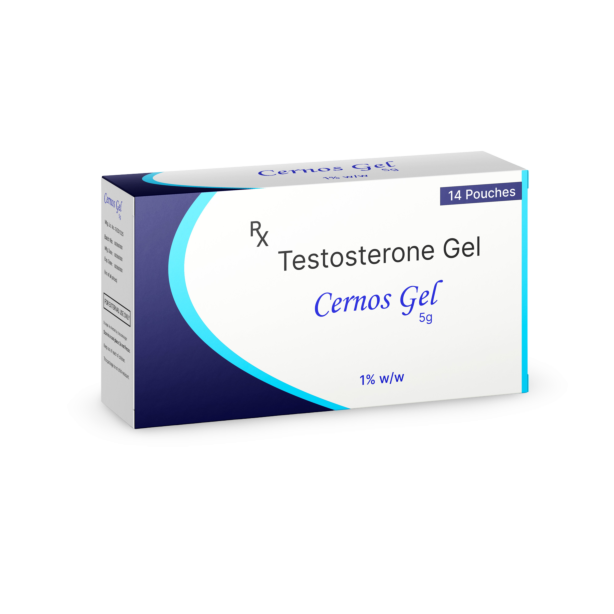
Cernos Gel 1% w/w
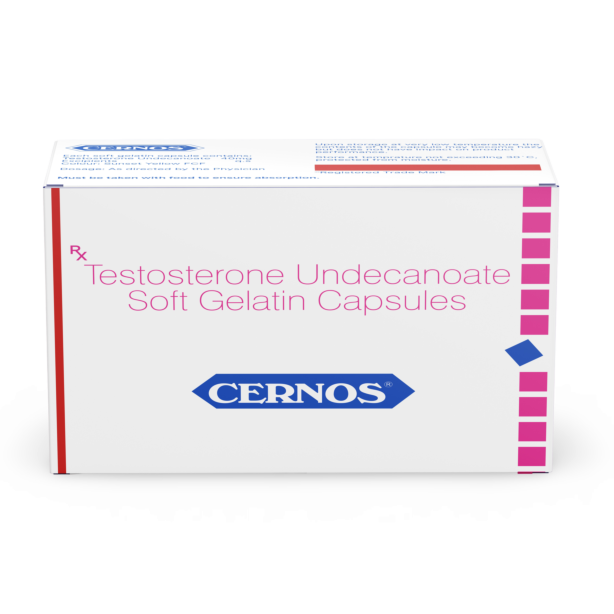
Cernos 40 mg Soft Gelatin Capsule
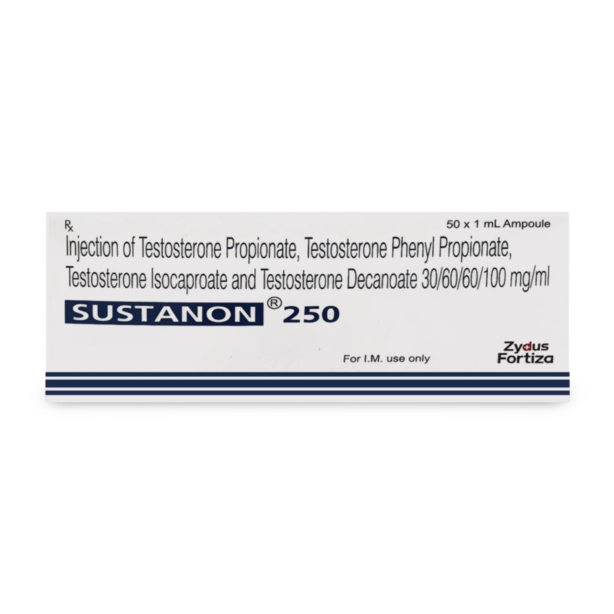
Sustanon 250 Injection
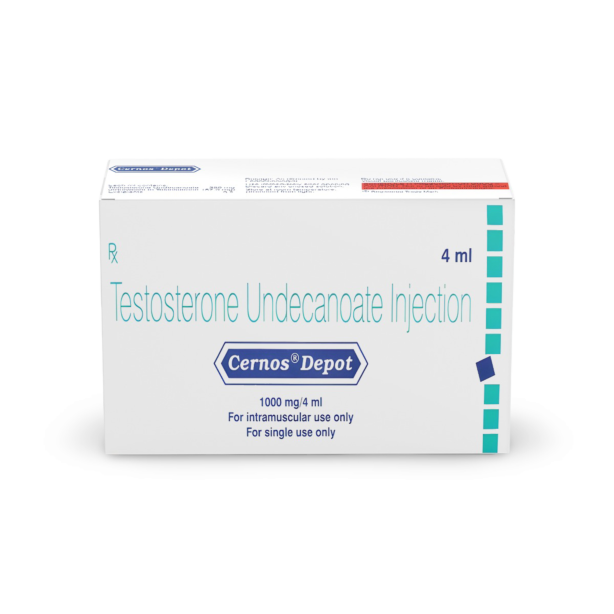
Cernos Depot 1000 mg Injection
Ways to prevent Low Testosterone
While Testosterone naturally declines with age, various aspects of life and preventative steps can help prevent a significant reduction and keep levels healthy. These include:
- Losing weight can significantly boost Testosterone levels. Obesity, particularly excess abdominal fat, is closely associated with Low Testosterone.
- Resistance exercises (weightlifting, bodyweight exercises like squats, and push-ups) are especially effective at increasing Testosterone production.
- Go for 7-9 hours of unbroken, quality sleep every night. Chronic sleep loss may greatly decrease Testosterone levels.
- Combine healthy fats in your daily meals, including avocados, olive oil, nuts, seeds, and omega-3 fatty fish (salmon, mackerel).
- Avoid processed foods, sugars, and unhealthy fats, as these may disrupt hormonal balance and lead to weight gain, all of which are unhealthy for Testosterone levels.
- Reduce stress by incorporating stress-reducing practices into your daily routine, such as meditation, yoga, and deep breathing exercises.
- Restrict alcohol intake as excessive alcohol consumption can reduce Testosterone levels and promote the conversion of Testosterone to Estrogen.
- Smoking is linked to reduced Testosterone levels. Quitting smoking can offer several health advantages, including improved hormone balance.
- If lifestyle changes are insufficient, your doctor may recommend Testosterone Replacement Therapy (TRT) to restore hormonal levels.
When to consult a doctor?
You should contact your healthcare provider if you experience:
- Ongoing fatigue and decreased sexual drive
- Unexplained weight gain or muscle loss
- Persistent mood swings or Depression
- Difficulty focusing
Early detection can help avoid long-term problems, including Osteoporosis, cardiovascular disease, and infertility.
Conclusion
Low Testosterone symptoms in men can significantly affect their physical health, mental health and overall quality of life. The impacts range from decreased libido and energy to muscle loss, mood fluctuations, and memory problems, and are frequently slow and misdiagnosed as aging or stress-related.
However, recognizing and treating these symptoms early on can result in effective treatment and noticeable improvement. Men can regain their hormonal balance and energy by making lifestyle adjustments, getting a comprehensive medical diagnosis, and using therapeutic choices such as TRT.
Ignoring the symptoms of Low Testosterone can result in long-term consequences such as Osteoporosis, infertility, and Depression. If you or someone you know is experiencing these symptoms, get medical help immediately. Preventive efforts can result in better health, stronger relationships, and a more satisfying life.

Frequently Asked Questions
Can Low Testosterone affect my sense of smell and taste?
Yes, decreased Testosterone levels can have a slight impact on sensory perception. It may limit sensitivity to fragrances or tastes by impairing nerve function and brain activity. However, this is uncommon.
Does Low T produce tingling or numbness in the extremities?
Yes. Low Testosterone levels can sometimes lead to Peripheral Neuropathy-like symptoms, particularly when combined with Diabetes or Obesity. Hormonal imbalances can indirectly affect nerve health, producing tingling sensations or numbness in the hands and feet.
Can Low T cause greater body odor?
Yes, hormonal changes caused by Low Testosterone can affect sweat glands and bacterial development, sometimes resulting in a greater or changed body odor. Though uncommon, it is a mild symptom frequently misdiagnosed as hygiene or nutrition issues.
Is dry skin connected to Low Testosterone levels in men?
Yes. Low Testosterone levels may decrease skin oil production, resulting in dry, flaky skin. Testosterone supports Collagen and hydration levels. Hence, a decline can affect skin texture and moisture, making men more susceptible to irritation and aging.
Can Low T make me more sensitive to the cold?
Yes. Low Testosterone levels may slow metabolism and circulation, increasing susceptibility to cold temperatures. While not as well-known, this thermoregulation problem can cause males to feel cooler than usual, even in generally pleasant environments.
When referencing outside resources, GoodrxMedicine always provides full citations. To learn more about the measures we use to maintain the quality of our content, please review our Content Information Policy.



